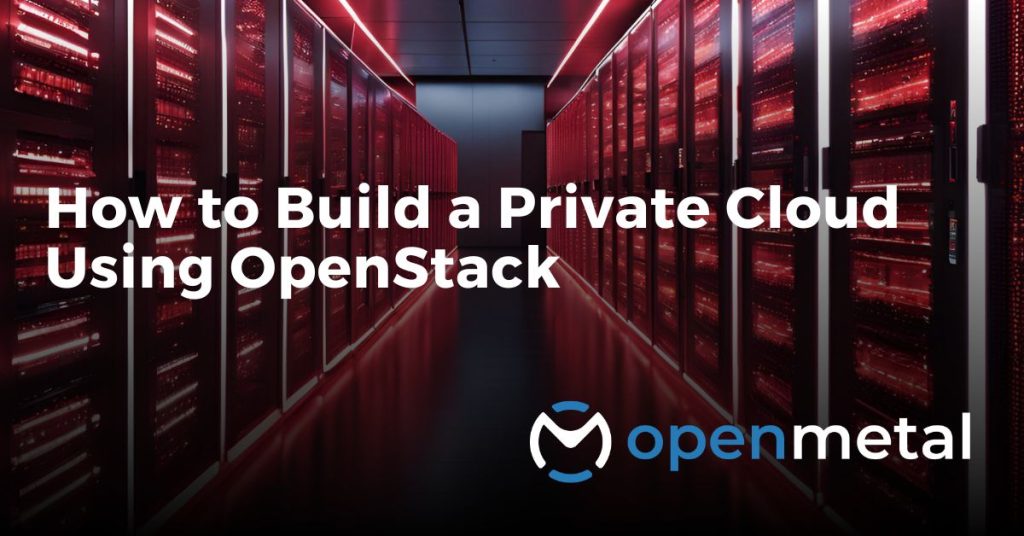In this article
- Key Advantages of OpenMetal’s Medium Hosted Private Cloud Hardware
- Considerations
- Customers Using our Medium Servers: Powering Diverse Workloads in the Real World
- High-Performance Computing (HPC) for Research and Development
- Data-Intensive Applications and Analytics
- E-commerce Platform or Web Application with Moderate Traffic
- How to Get Started on an OpenMetal Medium Hosted Private Cloud
Trying to figure out the best cloud hardware to match your needs? We’re here to help! OpenMetal’s Medium hosted private cloud hardware offers a solid combination of performance, scalability, reliability, and cost-effectiveness, making it a strong choice for businesses seeking a powerful and flexible cloud infrastructure without breaking the bank.
Specs:
- Three hyperconverged servers running a stack powered by OpenStack + Ceph (referred to as the OpenMetal Private Cloud Core)
- Each individual server consists of:
- Two Intel Xeon Silver 4510 CPUs – 24 cores / 48 threads, 2.4GHz base and 4.1GHz turbo with 30MB cache
- 256GB DDR5 4400MHz RAM
- 6.4TB NVMe SSD with two 960GB boot disks
- 20Gbps private bandwidth, and 2Gbps public bandwidth included
Key Advantages of OpenMetal’s Medium Hosted Private Cloud Hardware
- High Performance: This setup’s powerful Intel Xeon Silver 4510 processors, each with 24 cores and 48 threads, deliver exceptional processing power for demanding tasks. Combined with 256GB of fast DDR5 RAM per server and high-speed NVMe SSDs for rapid data access, this hardware ensures smooth and efficient operation even for the most resource-intensive applications.
- Scalability and Flexibility: The hyperconverged infrastructure, made up of three servers running OpenStack and Ceph, allows for easy horizontal scaling by adding more nodes as needed. The OpenStack platform provides a flexible foundation for deploying various tools and applications, adapting to different business needs.
- Reliability and Availability: With a three-server configuration and Ceph distributed storage, this setup ensures high availability and data redundancy, minimizing downtime risks. And as a hosted solution, OpenMetal manages the underlying infrastructure, reducing the burden of maintenance and updates for businesses.
- Cost-Effectiveness: The flexible pricing model, with options for monthly or long-term contracts, caters to different budgets. The availability of a month-to-month plan allows businesses to scale their infrastructure without long-term commitments, optimizing costs based on need.
- Network Performance: High-speed networking is facilitated by 20Gbps private bandwidth for rapid data transfer within the cluster – important for data-intensive operations. Additionally, 2Gbps public bandwidth ensures sufficient connectivity for most external communication and internet access requirements.
Considerations
- Public Bandwidth: While 2Gbps public bandwidth might be fine for internal applications or small-scale web hosting, businesses with high traffic or bandwidth-intensive applications may need to consider upgrading.
- Storage Needs: Evaluate long-term storage requirements. While 6.4TB NVMe SSD per server offers speed, consider adding HDDs for larger capacity and cost-effective storage of less frequently accessed data.
- Technical Expertise: Managing an OpenStack-based private cloud requires technical expertise. Ensure you have the necessary skills in-house or consider managed services.
Customers Using our Medium Servers: Powering Diverse Workloads in the Real World
Our Medium servers are proving their versatility and value across a range of industries. A leader in cloud-native data protection for Kubernetes and OpenStack environments, Trilio, has deployed 12 Medium servers. An innovative managed IT service provider for the film industry is using three Medium servers to power their infrastructure. And another customer that builds accounting software for the energy industry relies on three Medium servers for their big data needs.
These examples showcase the versatility of our Medium servers across many different fields. Priced significantly lower than our Large servers, they offer a great alternative for companies looking to expand their footprint at a manageable price. With roughly three times the CPU and double the RAM and storage of our Small servers, Mediums provide a sweet spot for:
- Scaling beyond development: Customers leverage Medium servers to move workloads into production at a reasonable cost.
- Handling demanding applications: The increased resources make them suitable for applications that require solid processing power and memory.
- Future-proofing infrastructure: Expandable memory and storage options ensure scalability as customer needs grow.
So what are some other ways you could effectively use this hosted private cloud hardware in your own organization? Here are some potential use cases and applications that are particularly suitable for this setup:

1. High-Performance Computing (HPC) for Research and Development
Scenario: A research institution or a corporate R&D department needing a high-performance computing cluster for tasks like simulations, financial modeling, or drug discovery.
Why This Hardware:
High Core Count and Clock Speed
The dual Intel Xeon Silver 4510 processors, with 24 cores and 48 threads per server, provide massive parallel processing capability. This is crucial for HPC applications that can divide their tasks across multiple cores, greatly reducing processing time.
The 2.4 GHz base clock speed, with a boost to 4.1 GHz, ensures individual cores can handle complex calculations quickly.
Generous Memory Capacity and Bandwidth
256GB of DDR5 RAM per server is essential for HPC workloads, which often involve manipulating large datasets in memory. DDR5 offers higher bandwidth than previous generations, allowing the CPUs to access data faster and further improving performance. This is particularly useful for memory-bound applications common in scientific simulations and financial modeling.
Low-Latency Storage
NVMe SSDs provide extremely fast read and write speeds compared to traditional hard drives. This is critical for HPC applications where data access is a major bottleneck. NVMe drives reduce latency, ensuring that the CPUs are not waiting for data, which means faster processing and quicker results.
Scalability for Growing Needs
The three-server setup, combined with OpenStack and Ceph, forms a scalable foundation. As computational demands increase, the cluster can be easily expanded by adding more servers.
Ceph distributed storage ensures data remains accessible and manageable across the growing cluster. This scalability allows research institutions and R&D departments to adapt their infrastructure to the fluctuating needs of projects.

2. Data-Intensive Applications and Analytics
Scenario: A company dealing with large datasets, such as a financial institution or a marketing agency, needs a robust infrastructure for data storage, processing, and analytics.
Why This Hardware:
High-Capacity, High-Performance Storage
Each server comes with a 6.4TB NVMe SSD, providing ample space for storing large datasets. NVMe drives offer significantly faster read and write speeds compared to traditional hard drives, which is important for data-intensive applications where data access speed directly impacts processing and analysis times.
The use of Ceph distributed storage across the three servers not only expands the total storage capacity but also ensures high availability and data redundancy. Even if one server or drive fails, data remains accessible, minimizing disruption to analytics workflows.
Fast Intra-Cluster Communication
The 20Gbps private bandwidth between servers is essential for efficient data transfer within the cluster. High bandwidth allows for rapid movement of data between nodes, which is crucial for distributed data processing and analysis tasks. For example, in a big data analysis scenario, different parts of a dataset might be processed on different servers, and the high bandwidth ensures smooth and efficient communication between these nodes.
Powerful CPUs for Complex Analysis
The dual Intel Xeon Silver 4510 processors, with their high core count and clock speeds, provide the necessary computational power to handle the complex processing demands of data analytics workloads. Tasks like data transformation, statistical modeling, and machine learning often require significant CPU resources, and these processors are equipped to handle such demands.
Ample In-Memory Processing Capabilities
256GB of DDR5 RAM per server enables efficient in-memory processing of large datasets. Many data analytics techniques, such as real-time analytics and interactive data exploration, benefit greatly from having data readily available in memory. The high capacity and bandwidth of DDR5 memory ensure that data can be quickly loaded and processed, leading to faster insights and improved responsiveness.
OpenStack for Flexibility and Control
OpenStack provides a flexible and robust platform for managing and deploying data analytics tools and applications. Being open source and having an extensive ecosystem allow for easy integration with a wide range of data processing frameworks, databases, and visualization tools. This gives businesses the freedom to choose the best tools for their specific needs and easily adapt their infrastructure as those needs evolve.
Private Cloud for Enhanced Security
A private cloud environment offers security and control over sensitive data, which is important for industries dealing with confidential information like financial records or customer data. With this setup, businesses have complete control over their data and can implement robust security measures to protect from unauthorized access and cyber threats.

3. E-commerce Platform or Web Application with Moderate Traffic
Scenario: A growing online business requires reliable and scalable infrastructure to host its platform, handle customer data, and manage inventory. They have moderate but steady traffic with occasional spikes during sales and brand promotion.
Why This Hardware:
High-Performance Processors for Handling Traffic
The dual Intel Xeon Silver 4510 processors, with 24 cores and 48 threads each, deliver the processing power needed to handle a large number of concurrent users and transactions. This is necessary for platforms where smooth user experience and quick response times are essential, especially during peak traffic periods like sales and promotions. These processors can efficiently handle tasks such as processing orders, updating inventory databases, and running web server software, providing a responsive online experience for customers.
Ample Memory for Responsiveness
256GB of DDR5 RAM per server ensures fast data access and responsiveness, which are vital for a positive customer experience. With ample memory, the online platform can quickly retrieve product information, customer data, and other essential information from memory, resulting in faster page loads and reduced latency. This is particularly important for web-based businesses as slow loading times can lead to customer frustration and lost sales.
Fast Storage for Quick Access
6.4TB of NVMe SSD storage per server provides rapid read and write speeds, significantly improving performance. NVMe drives minimize latency, ensuring quick page loads, efficient order processing, and minimal delays for users. Fast storage also benefits database operations, which are critical for managing product catalogs, customer information, and order history.
Scalability for Future Growth
The OpenStack + Ceph platform provides the foundation for a highly scalable infrastructure. As the business grows and traffic increases, additional servers can be seamlessly added to the cluster to handle increased demand. Ceph distributed storage ensures data remains accessible and manageable across the expanding cluster. This scalability allows online businesses to adapt infrastructure to accommodate future growth without disruption or performance degradation.
High Availability for Business Continuity
The three-server setup ensures high availability and minimizes the risk of downtime. If one server fails, the other two can take over its workload, ensuring uninterrupted service for customers. This redundancy is crucial for web businesses and applications where any downtime can result in lost revenue and damage to brand reputation.
Cost-Effectiveness for Growing Businesses
The monthly cost of this hardware, especially with the option for a five-year contract, offers a good balance of performance and affordability for a growing online business. This allows organizations to invest in a robust and reliable infrastructure without excessive costs, enabling them to allocate resources to other areas of their business such as marketing and product development.
How to Get Started on an OpenMetal Medium Hosted Private Cloud
OpenMetal’s medium hosted private cloud hardware offers a combination of performance, scalability, and affordability. Its technical specifications make it a great choice for a range of business scenarios, from high-performance computing to powering your online business. The flexibility of the platform, coupled with our transparent billing and the ability to lock in your price for up to five years, makes it a solid choice for businesses on the lookout for a robust and adaptable cloud infrastructure.
If our Medium hardware seems like a match for your needs, we offer a few options to get started:
Apply for Trial View Catalog & Pricing Request a Quote
Questions? Contact us.
Read More on the OpenMetal Blog
How to Create a DevOps Culture In Your Workplace
If your organization is new to exploring the possibilities with DevOps, it may be a challenge to rethink and rework what you’re currently doing. So how can you effectively create a DevOps culture within your workplace, with as little time + money wasted as possible?
Demystifying Open Source Cloud: What You Need to Know
If you’re searching for a solution to take full control of your infrastructure, you might have come across the term “open source cloud.” But what exactly is it? In this comprehensive blog, we’ll dive into the concept of open source clouds and explore why they are the ultimate key to empowering organizations.
How to Build a Private Cloud Using OpenStack
So you want your own private cloud! Now you have to figure out your options for getting there. As a huge fan of open source, we recommend you build a private cloud on OpenStack. Here are some tips and guides for doing so.






































